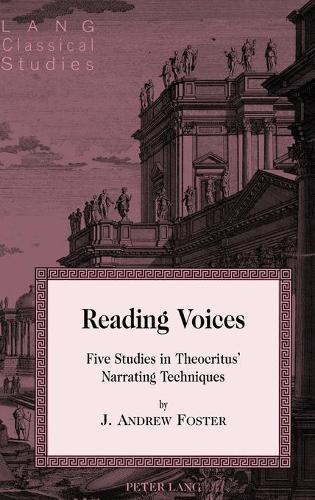Readings Newsletter
Become a Readings Member to make your shopping experience even easier.
Sign in or sign up for free!
You’re not far away from qualifying for FREE standard shipping within Australia
You’ve qualified for FREE standard shipping within Australia
The cart is loading…






This title is printed to order. This book may have been self-published. If so, we cannot guarantee the quality of the content. In the main most books will have gone through the editing process however some may not. We therefore suggest that you be aware of this before ordering this book. If in doubt check either the author or publisher’s details as we are unable to accept any returns unless they are faulty. Please contact us if you have any questions.
This book is a study of Theocritus’ narrating techniques, intertextual practices, and the relationship between them. By a close, careful description and analysis of these features as particularly deployed in Idylls 6, 11, 13, 24, and 15, J. Andrew Foster provides detailed readings of these specific poems, demonstrating how each poem’s narrative structure and its intratextual and intertextual affiliations interact to characterize the voices and audiences expressed and imagined by the discourse. Within these poems Theocritus especially orchestrates polyphonic voices speaking to diverse fictional, ideal, and actual audiences and so authorizes a range of responses to speech-in-text. His densely allusive poems exhibit an iterative aspect and resistance to closure that particularly encourage his readers to help compose larger metanarratives in which such resolution can be achieved or the particular episode can be better understood. The interplay between the referential systems inscribed within these poems and their rhetorical structure exemplifies how Theocritus encourages his poetry to be incorporated into a wider literary discourse by which that wider literary landscape is transformed. Within these experiments in narration and reception, Theocritus exhibits an intense engagement with the literary past and his critical present whose receptions and authority are continually problematized. These readings will serve as a springboard into the wider ongoing study of the problems of poetic voice, authority, and literary innovation within Theocritus’ poetry in particular and Hellenistic poetry in general.
$9.00 standard shipping within Australia
FREE standard shipping within Australia for orders over $100.00
Express & International shipping calculated at checkout
Stock availability can be subject to change without notice. We recommend calling the shop or contacting our online team to check availability of low stock items. Please see our Shopping Online page for more details.
This title is printed to order. This book may have been self-published. If so, we cannot guarantee the quality of the content. In the main most books will have gone through the editing process however some may not. We therefore suggest that you be aware of this before ordering this book. If in doubt check either the author or publisher’s details as we are unable to accept any returns unless they are faulty. Please contact us if you have any questions.
This book is a study of Theocritus’ narrating techniques, intertextual practices, and the relationship between them. By a close, careful description and analysis of these features as particularly deployed in Idylls 6, 11, 13, 24, and 15, J. Andrew Foster provides detailed readings of these specific poems, demonstrating how each poem’s narrative structure and its intratextual and intertextual affiliations interact to characterize the voices and audiences expressed and imagined by the discourse. Within these poems Theocritus especially orchestrates polyphonic voices speaking to diverse fictional, ideal, and actual audiences and so authorizes a range of responses to speech-in-text. His densely allusive poems exhibit an iterative aspect and resistance to closure that particularly encourage his readers to help compose larger metanarratives in which such resolution can be achieved or the particular episode can be better understood. The interplay between the referential systems inscribed within these poems and their rhetorical structure exemplifies how Theocritus encourages his poetry to be incorporated into a wider literary discourse by which that wider literary landscape is transformed. Within these experiments in narration and reception, Theocritus exhibits an intense engagement with the literary past and his critical present whose receptions and authority are continually problematized. These readings will serve as a springboard into the wider ongoing study of the problems of poetic voice, authority, and literary innovation within Theocritus’ poetry in particular and Hellenistic poetry in general.